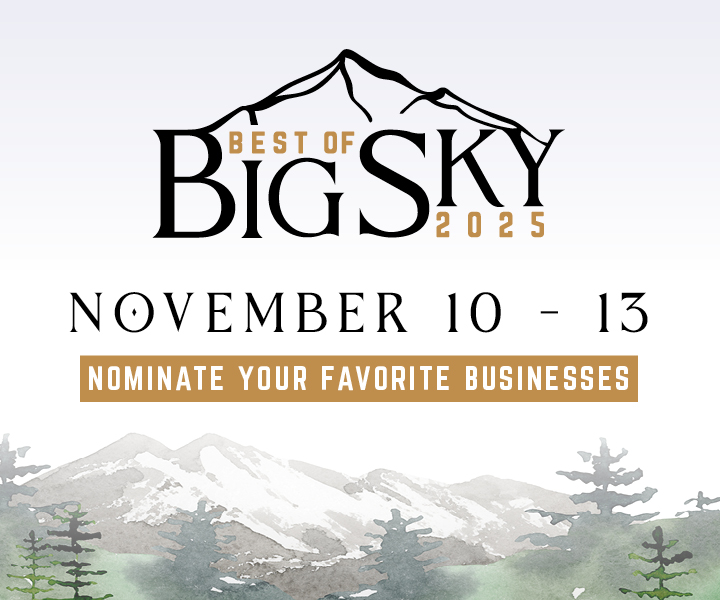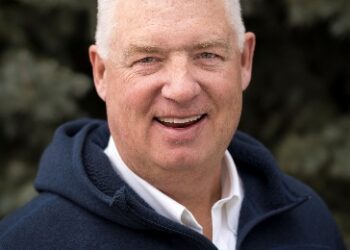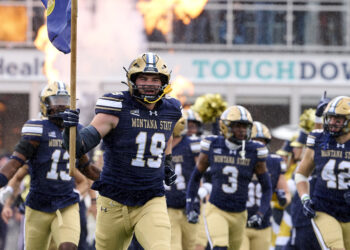By Joseph T. O’Connor explorebigsky.com Editor
BOZEMAN – Since moving to northwest Montana in 1987, author Rick Bass has garnered critical acclaim for his more than 25 books of fiction and nonfiction, many of which are centered around his home in the Yaak Valley.
On April 10, the Texas native flew home from South America, where he’d been traveling with his daughters Mary Katherine and Lowry, for two weeks. Two days later Bass drove from Missoula to the Museum of the Rockies in Bozeman to give the 2013 Wallace Stegner Lecture, called “The Landscape of Imagination.”
Taking the stage in lace-up cowboy boots, crisp black slacks and a new white shirt with only a tiny wine spot, he got down to business. “I live in a place that amazes me,” said Bass, 55, opening the lecture. “I’m deaf as a result. I’ve shot a lot of shotguns.”
As he read two essays and answered questions from the capacity audience, Bass was accessible and funny, with a comedian’s timing. It became clear that Montana is part of the author’s core: It pulsates through his writing and the environmental activism to which he’s dedicated his life.
In a pre-lecture interview however, he was thoughtful, deliberate, even humble. Sitting down with the Weekly at Wild Joe’s Coffee shop over a strawberry smoothie, Bass discussed his inspirations, his writing process and getting arrested with Daryl Hannah.
—–
Big Sky Weekly: Why did you move to Montana?
Rick Bass: I wasn’t seeking Montana. After school in Utah, I got a job in Mississippi as an oil and gas geologist. I missed the landscape of the West, so I packed my maps and electrical logs and drove looking for a place to move… I kept going north and west, and it wasn’t until I got [to] Montana that I started feeling the spaciousness I remembered.
BSW: Where do you like to ski?
RB: I love Whitefish [Mountain Resort]. It can be foggy, but I love the feel of the mountain, the people and the views when you can get them. No lines. Of course there’s backcountry too, dinking around the Yaak.
BSW: Do you fish or hunt?
RB: I don’t fish, but I hunt a lot – birds, deer and elk.
BSW: What else do you do in your free time?
RB: My daughters are almost grown up. [Mary Katherine] is 21 and off to college, and the 18-year-old [Lowry] is about to go. I do a lot of environmental advocacy, [which] takes up a huge amount of time.
BSW: When did you start writing?
RB: It was in Mississippi. I read Jim Harrison’s novella Legends of the Fall, and it made me want to write fiction. I’d write on my lunch breaks, in the evenings after work, and on location at a well. I taught myself to write – I didn’t study it in college.
BSW: How do you see oil development in the Bakken formation affecting Montana?
RB: It’s going to be significant. [Drilling] changes the character of a landscape, the character of a state. It will make Montana not be Montana. The [associated] water issues are going to have huge negative effects on agriculture and traffic. You don’t just go in, set up a 3-acre drill pad, drill an 8 5/8-inch hole down, set casing and leave. Things break, leak [and] need maintenance… You’ll wear the state out servicing that big play. I wouldn’t wish an oil field economy on anybody.
BSW: Do you see any positives to this development?
RB: No. It takes our eye off alternative energy, off everything we should be moving toward – water conservation, community development … It’s one more chapter in a familiar Montana story – colonial outposts yielding resources to the global market.
BSW: Will it help the U.S. depend less on foreign oil?
RB: We’ll sell to anybody as the price goes up. We’ll sell it to China before we’ll sell it to ourselves, and we’ve proved that by our debt … There is no domestic oil; there is no foreign oil. It’s one big market.
BSW: You were in Washington D.C. on Feb. 13 protesting the Keystone XL pipeline. Tell me about getting arrested with Daryl Hannah.
RB: (Laughs) She’s a pretty lady. It was a wonderful experience. There were a lot of heroes there. [Climate change] is not an environmental issue, it’s a social justice issue, [and] Montana is ground zero for so many world-changing decisions. Do we fight the tar sands [in Canada] or welcome them into Montana, the first state to accept the Keystone pipeline? We can stop it from going to the Gulf and getting on ships to Asia, where it’s bound.
The Otter Creek sale [in south central Montana also] has huge implications… They’re subsidizing a billion and a half metric tons of coal too dirty to burn in the U.S. and sending it to China. It’ll [create] another 50 years of coal-based world economy. And it’s coming from Montana.
BSW: What’s clean coal?
RB: There’s not any clean coal – it’s a nice sound bite. It’s lithified coal carbon [that] comes from swamps … low oxygen, high sulfur environments, high anaerobic activity. There’s a lot of heavy metals in those swamps, [so] you’re producing higher amounts of carbon dioxide than anything else… Natural gas is our cleanest fossil fuel.
BSW: How do we solve our energy problems?
RB: It’s not a popular answer, but we need truer accounting of what we burn – not equating energy merely and simply with BTUs but with the fuller cost of the damage it does. If we’re going to poison the water and air and make the sea level rise faster, we should factor that into the equation and pay for it.
BSW: What about hydraulic fracturing?
RB: It’s effective, but we’re paying the same for a barrel of oil from fracturing as one from west Texas [that] had no sulfur, 18 percent porosity with 300 millidarcies permeability. The economic system is artificial. It’s primitive and it’s killing wilderness in the West, our communities, our economy. It’s frustrating for me to have been on the inside and know what’s happening.
BSW: Do you see Montana moving toward a similar model that the Williston, N.D. area has adopted, regarding extraction?
RB: The density of development is going to wash west to the Rocky Mountain Front. The state budget and schools will get a boost, but it won’t leave a heritage of integrity – it’s fast money, and it changes people’s relationship to time. Things move faster and become cheaper. It’s the density of temporal workers, who aren’t there for the community or the landscape but are chasing the resource. That’s not what Montana is about.
BSW: Tell me about your writing process.
RB: Environmental activism has affected my literary voice. You need to know your audience. You need to know when you say a certain buzzword, how each [person] is going to respond – it’s a hyper-awareness to be cautious in my persuasive efforts, and accurate, yet not compromise my passion, which is the root of any art.
BSW: What’s the most challenging aspect of writing for you?
RB: Focus. It’s so easy to be distracted. Setting time aside is mechanical, [and] technical challenges can be learned or fixed with editors, but focus is hard to control and to achieve once you’re into the story. It’s discipline.
BSW: What do you want the audience at the Wallace Steger Lecture to leave with?
RB: Gratitude toward the work of Wallace Stegner and other artists/activists of the West. [Also], the commitment to be arrested on this Keystone deal – it’s an issue of massive moral implications and social justice, something I don’t think we as a people – as a state, as a country – want our fingerprints on… I’m not advocating violence, but this is a civil rights issue of our era. When bad things happen in history, people look back and say, “What were they thinking? Why did they just let it happen?”













